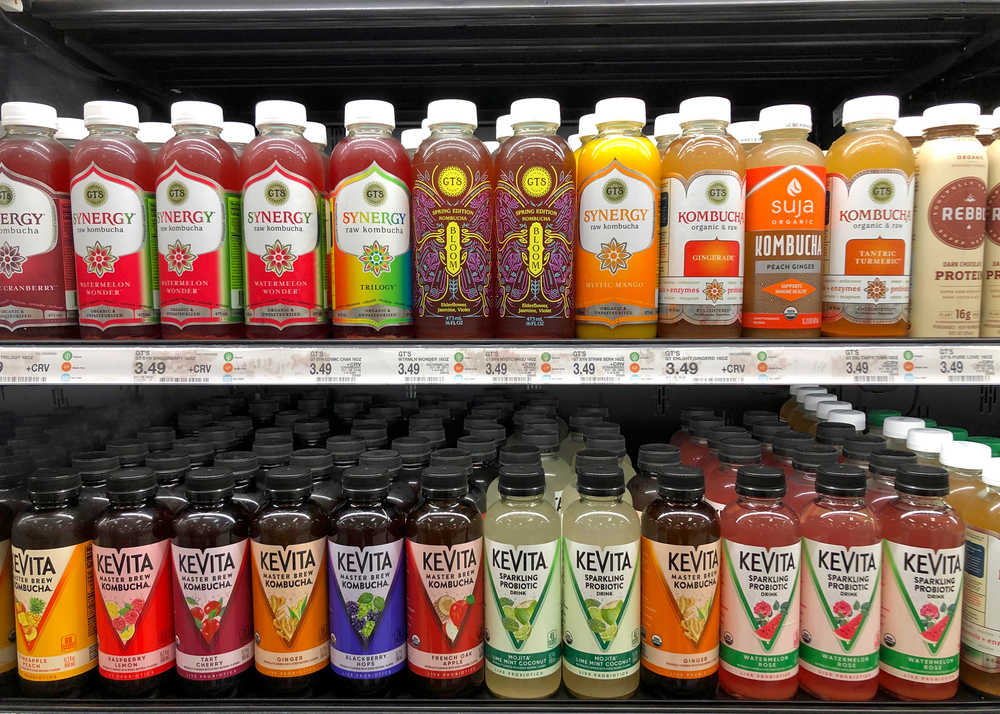Kombucha's great taste and detoxifying potential make it a popular beverage choice. Despite all its goodness, is there such a thing as too much kombucha? How much kombucha should you drink a day? As it turns out, there's a limit to the amount of kombucha you should drink daily, and it varies from person to person.
Table of Contents
Is it Okay to Drink Kombucha Every Day?
While the intro may sound like a word of warning, I am not here to dismiss the health benefits of kombucha. It’s perfectly okay to drink kombucha every day, granted that you’re body is reacting well.
The probiotics developed during the kombucha fermentation process have been linked with numerous positive effects: from improved digestion and immune system to decreased blood sugar levels and lower cancer risk.
How Much Kombucha Should You Drink For Gut Health?
You should drink one to two servings of kombucha daily to reap the benefits of good gut health. Keep your daily kombucha intake under 16 oz or 480 mL.
Of course, your tolerance may vary. If you’re still beginning your kombucha journey, you should start small and gradually work up to minimize potential side effects. While our standard recommendation is to drink one bottle daily, you can go slightly beyond a bottle if your body isn’t reacting negatively.

As a word of warning, pregnant women, breastfeeding women, and people with diabetes may want to keep their fermented tea consumption to a minimum or discuss the beverage with their doctor first. Most kombuchas have low amounts of alcohol (.5% ABV) and added sugars.
When Should You Drink Kombucha?
There’s no strict schedule when it comes to drinking kombucha. Drink it whenever you feel like it. This low-calorie, low-sugar, fizzy fermented drink can make a great morning or mid-afternoon pick-me-up.
We lightly suggest you drink kombucha during the morning. It’s loaded with vitamin B, enzymes, organic acids, and probiotics which can provide a potent energy boost, allowing you to get through the day more readily.
Similarly, drinking kombucha at night may not be a good idea. One of its primary ingredients is black or green tea leaves, which have caffeine. At the end of the process, most kombucha only has about 15 mg of caffeine per serving. As such, some people abstain from drinking kombucha during the late night hours. You may also switch to white or oolong tea leaves if you’re brewing kombucha at home.
Can You Drink Kombucha on an Empty Stomach?
Yes, you can drink kombucha on an empty stomach to reap its detoxifying effects. An empty stomach is a perfect environment for the kombucha’s good bacteria to make their way to your intestines more quickly and consequently work their healthy magic there.
While kombucha’s inherent acidity may worry some, it’s okay to drink kombucha on an empty stomach once your body gets used to the probiotics. If you have a sensitive stomach, get your body used to the acidity first by drinking it with your meals. Once your digestive system can handle it, you can start drinking kombucha on its own!

What Happens If You Drink Too Much Kombucha?
Kombucha tea is an excellent health beverage, but like many fermented foods, having too much of it can lead to health consequences.
Here are some of the signs that you’ve ingested more kombucha than your body can handle:
- Weight gain due to excess calorie consumption
- Bloated feeling
- Elevated caffeine
- Elevated sugar
- Tooth problems
- Liver problems
While these are all potential side effects of drinking too much kombucha, many rarely occur. If you’ve been drinking more than two bottles of kombucha daily for several weeks or more, you may benefit from checking in with a medical professional to assess your health status properly.
Practical Tips For Drinking Kombucha Every Day
Kombucha is a terrific source of antioxidants and probiotics; you do your body a favor by drinking it daily. To minimize any potential side effects and maximize the benefits of kombucha, remember the following:
- Regularly hydrate yourself with water to mellow out the beverage’s acidity.
- Storebought kombucha contains a low but present alcohol content; beware if you’re particularly sensitive to alcohol.
- Caffeine is present in most kombucha, so avoid drinking it late at night if you’re caffeine-sensitive.
- Some commercial kombucha has added sugars from fruit juice to enhance the drink’s flavor; if you follow a low-sugar diet, read the nutrition label before buying and opt for low-sugar brands.
- Eat food with kombucha before drinking it on its own; your body can gradually adapt to its acid levels.
Indulging in kombucha is tasty and healthy. By drinking it regularly, your body will receive the beneficial effects of probiotics and vitamins needed to stay healthy. Like everything, enjoy it in moderation.

